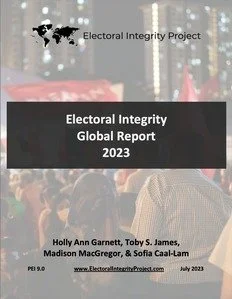The new report from the Electoral Integrity Project has reported that election quality has held steady around the world – and increased in many countries.
There have been widespread concerns about democratic backsliding around the world with the US launching a Summit for Democracy, asking countries to make commitments to support democratic reform.
The Electoral Integrity Global Report notes that there is no evidence of an overall decline in the quality of elections worldwide since 2012.
There was an increase in election quality in many countries that received widespread international coverage. Despite the president-hopeful Raila Odinga’s contestation of the election results, this election continued the upward trend in electoral integrity Kenya has seen since 2013.
Despite the protests from Bolsonaro supports, the 2022 presidential election in Brazil saw general stability in terms of electoral integrity across the board.
The 2022 midterm elections in the United States showed an improvement from the 2020 presidential election.
Denmark Leads
The Electoral Integrity Global Report publishes data on the quality of elections worldwide each year, based on expert perceptions. Denmark was reported as to having the highest quality elections internationally.
On a 100-point scale, elections with the highest levels of electoral integrity are once again in Western Europe, with Nordic countries Denmark (87) and Sweden (81) having some of the top-rated elections of 2022, alongside Austria (83) and Slovenia (80).
Elections with the lowest levels of electoral integrity included contests in countries from Sub-Saharan Africa (with the Republic of Congo (27), Angola (31) and Equatorial Guinea (16) having some of the lowest rated elections). These countries particularly struggled with electoral laws, the voting process, and/or the performance of electoral authorities. Outside of Africa, contests in Serbia (38) and Turkmenistan (23) were also included in the bottom five elections of 2022.
Regional variation continues, with the Nordic countries and Western Europe demonstrating consistently in high electoral integrity, while regions like Central and Eastern Europe, the Middle East, and Sub-Saharan Africa showcase a range of challenges and opportunities for improvement of electoral processes.
Electoral campaigns the biggest weakness
The Index indicators of the integrity of campaign environment were the lowest scoring stages of the electoral cycle, with campaign finance and campaign media again at the bottom. Conversely, the election procedures, vote count and results were found to be the highest quality.
Academics and practitioners to discuss electoral integrity
The Electoral integrity Project will be holding an international conference during the week of the 5th July which will bring together policy makers, academics and practitioners researching elections from over 50 countries are expected to attend quality.
Dr Holly Ann Garnett said: “Some of the key challenges for electoral integrity remain those related to the campaign environment, with campaign finance and media among the lowest overall. Further work is needed to level the playing field and address concerns about the quality of information voters receive to make their deliberations.”
Professor Toby S. James said: ‘We certainly should not be complacent about the quality of elections. The Global Electoral Integrity Report certainly shows, however, a story democratic resilience as much as backsliding. The efforts of electoral officials, legislators and the international community to protect election quality in many countries should be noted and applauded.’

